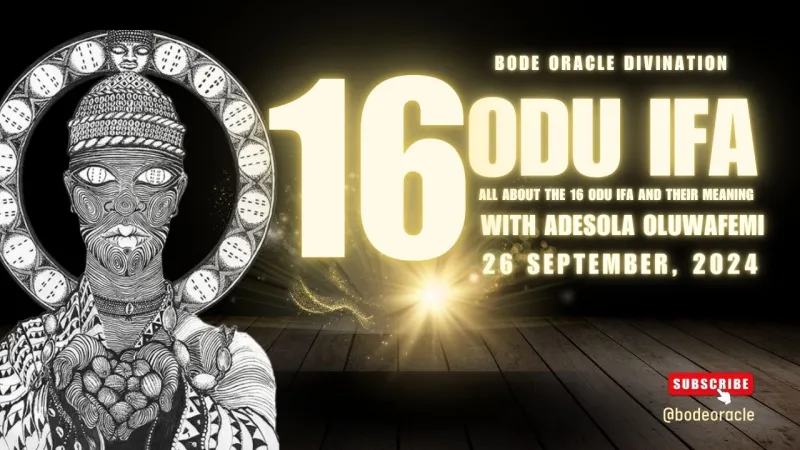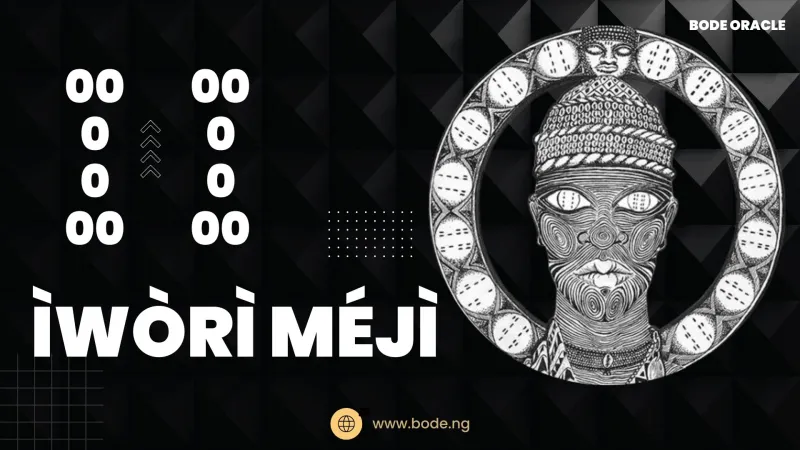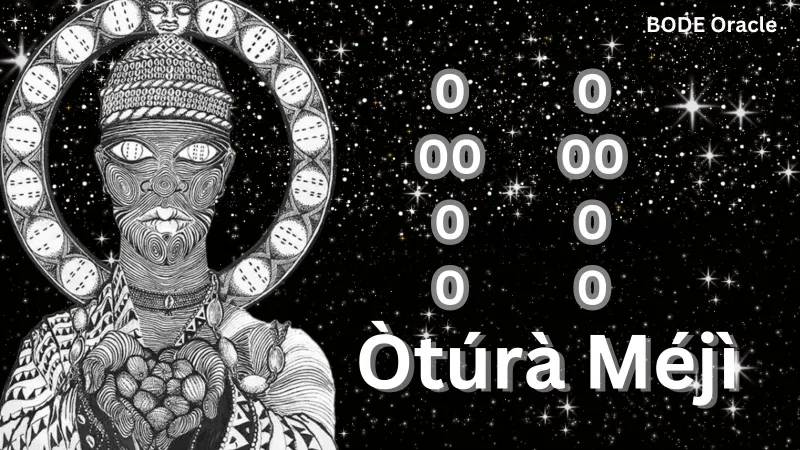The 16 Odu Ifa are based on symbolic and allegorical parables found in the Core Chapters or Principles that serve as the foundation of the Ifá divination system, a spiritual tradition originating from the Yoruba people of Nigeria.
Ifá is deeply rooted in the Yoruba religion but has also been integrated into other spiritual practices such as West African Vodun and African diasporic religions like Cuban Santería.
According to the teachings of Ifá, the divinatory system is guided by Orunmila, believed to have granted this knowledge to humanity.
The structure of Ifá follows an initiatory tradition, where those initiated into the practice and the flag bearer are referred to as babaláwo or Iyanifa. Although babaláwo are traditionally male, while Iyanifa are women.
Many women in the diaspora have been initiated into Ifa in regions like Cuba, Brazil, Mexico and some other parts of South America.
The sacred literary corpus of Ifá consists of 256 distinct signs. These are classified into two main categories. The first is the Ojú Odù, or the main Odù, which contains 16 chapters.
The second category, known as Amúlù Odù, consists of 240 chapters formed through combinations of the 16 core Odù. Together, these chapters and verses form the basis for understanding and interpreting the wisdom of Ifá divination.
They use either the divining chain, known as Ọ̀pẹlẹ̀, Iyere Osun powder, or sacred palm nuts or kola nuts called Ikin, on a wooden divination tray referred to as Ọpọ́n Ifá, to identify which Odu is relevant to addressing a particular problem.
You might also want to read more on Odu Ifa and Yoruba Spirituality for more insight about this divination system and practices.
Ìwòrì Méjì: The Origin Of Ifa
As narrated in Ìwòrì Méjì, the origin of Ifá was marked by a significant crisis where Orunmila was insulted, provoked, and betrayed in an act of rebellion and treason.
The most painful part of this uprising was that it was initiated by his youngest son. This son refused to pay homage to Orunmila, boldly proclaiming, "Ènìkan kìí fọrí adé balẹ̀ f’énìkan" ("A ruler does not bow before another ruler").
Upon hearing this defiant act of insubordination, Orunmila was filled with rage and, in a fit of anger, uprooted his silver staff.
This is what follows:
Ni Ọ̀rúnmìlà bá kọrí sí ìdí ọpẹ àgùnká,
Èyí tó yà sí ya búkà mẹrìndínlógún.
Ló bá di wí pé aboyún ò bí mọ́:
Àgàn ò tọwọ́ àlà bosùn;
Òkùnrùn ò dìde:
Akérémọdò wẹ̀wù ìràwé;
Àtọ́ gbẹ mọ́ ọmọkùnrin ní ìdí;
Obìnrin ò rí àṣẹ ẹ rẹ̀ mọ́.
Iṣú pẹyin ò ta;
Àgbàdo tàpẹ́ ò gbó:
Erèé yọjú ọ̀pòlọ́.
Òjò páápààpáá kán sílẹ̀,
Adìẹ́ sà á mì.
A pọ́n abẹ sílẹ̀ ewúrẹ́ mú un jẹ.
Gbogbo ayé wá á ń wí pé:
Nígbà tí Ọ̀rúnmìlà n bẹ láyé
Báyií kọ́ layé rí.
Following the events described, Orunmila left the world in a state of fury, abandoning his throne after the coup against him. The coup, unfortunately, was successful, and Orunmila retreated to a palm tree with sixteen branches, where he disappeared forever.
This is why palm tree has since become a sacred symbol in Ifá divination, and the number sixteen holds profound significance in the system. However, the repercussions of Orunmila’s departure were dire.
As the excerpt explains, his absence led to chaos in the world—poverty, diseases, famine, infertility, drought, and pestilences plagued humanity.
The suffering was immense, and the people lamented, acknowledging that life had been far better when Orunmila was present on earth.
Desperate for relief, the people made offerings and appealed to Orunmila to return, journeying to the palm tree with sixteen branches to ask for his leadership once again.
Yet, Orunmila refused their pleas, insisting that he would not return. Instead, he instructed them to open their palms and gave them sixteen special palm nuts, called Ikin.
He told them that whenever they needed guidance, encountered difficulties, or sought explanations, they should consult the sixteen palm nuts. These Ikin became the foundation of Ifá divination.
In response, the Yoruba sages and ancestors, demonstrating remarkable wisdom, expanded upon Orunmila’s gift.
They multiplied the number sixteen by itself, arriving at 256 systems of knowledge known as Odu Ifá, or Odù Àbáláyé. The sacred sixteen forms the core of Ifá, symbolizing a profound and eternal source of wisdom.
What Does Ifa Mean? Check out our in-depth guide on all what you need to know about Ifa and its teachings.
What Are The 16 Odu Ifa And Their Meaning?
The 16 Odu Ifa represent the core teachings and symbolic parables in the Ifá divination system, an ancient practice of the Yoruba people of Nigeria.
Each Odu carries unique spiritual principles, offering insights into different aspects of life. Here's a detailed explanation of each Odu Ifa:
1. Ogbe
Principle: Alignment with Destiny
Ogbe emphasizes perfect alignment with one's destiny. According to Ifa teachings, human destiny is deeply rooted in the development of good character.
This Odu speaks to the importance of following a path of integrity to achieve harmony in life.
2. Oyeku
Principle: Endings as New Beginnings
Oyeku symbolizes death, not as a final end but as the conclusion of cycles. It represents the end of hardship, whether it's poverty, illness, or loneliness. This Odu teaches that after every ending, there is a new beginning.
3. Iwori
Principle: Realizing Potential
Iwori focuses on the ability to recognize and act on real possibilities in life. It highlights the importance of discerning what is achievable and taking the right steps to manifest those possibilities.
4. Odi
Principle: The Power of Sealing
Odi refers to the spirit of female reproductive organs and symbolizes sealing or guaranteeing something. In ceremonies, the act of sealing ensures that the outcome is permanent, such as the irreversible process of birth.
5. Irosun
Principle: Protection and Preservation
Irosun represents the spirit that protects the head (Ori) and preserves the past. It signifies the inflexible reality of history and how past events shape the present and future.
6. Owonrin
Principle: Manifesting Potential
Owonrin means "brought by the hands," emphasizing that the solid foundation of the past lays the groundwork for the future. This Odu teaches that while human potential is fixed, how it manifests depends on individual choices.
7. Obara
Principle: Humility and Abundance
Obara symbolizes the struggle between humility and arrogance. This Odu suggests that those seeking abundance must first overcome arrogance to access their creative potential.
8. Okanran
Principle: Focus and Direction
Okanran warns against scattering one’s attention and emphasizes the importance of focusing on specific goals. It symbolizes new beginnings and the need to direct one’s energy effectively for success.
9. Ogunda
Principle: Courage and Responsibility
Ogunda speaks to the courage of Ogun, the god of iron, in facing obstacles. It teaches that instead of blaming others for problems, one must take responsibility and face challenges head-on with courage.
10. Osa
Principle: The Broken Promise
Osa tells the story of a broken promise between humans and birds, which led to the wrath of the Eleye (birds) and interference in human affairs.
This Odu warns that breaking sacred promises leads to disharmony and the need for appeasement.
11. Ika
Principle: Avoiding Evil
Ika warns against evil thoughts, actions, and words. It emphasizes that doing good attracts blessings from Olodumare (God), while evil deeds lead to misfortune.
12. Oturupon
Principle: Instability and Courage
Oturupon deals with the instability of life’s forces and the importance of intelligence in navigating challenges. This Odu is linked to the Ancestor (Egungun) and emphasizes the need for spiritual guidance and courage.
13. Otura
Principle: Peace and Harmony
Otura represents peace, love, and harmony. It teaches that through introspection and spiritual growth, individuals can align with their destiny and achieve enlightenment.
14. Irete
Principle: Longevity and Prosperity
Irete speaks of initiation into Ifa to ensure long life and good health. It encourages sacrifices and rituals to promote prosperity and fulfillment in life.
15. Ose
Principle: Sacrifice for Fulfillment
Ose advises that sacrifices must be made to achieve life’s desires. For those struggling with fertility or financial problems, this Odu suggests that making the right offerings will bring children, a spouse, and financial success.
16. Ofun
Principle: Alignment with Destiny
Ofun emphasizes the importance of being in alignment with one's destiny. It signifies that those who are spiritually disciplined and committed to their path will receive blessings from the Divine.
You can learn more about the 256 Odu of Ifa, Interpretation and Meaning in our Comprehensive List of Odu Ifa Divination Corpus.



